
Year in Review 2006–07: Part 1
July 2006
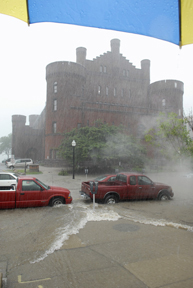
A July storm floods Library Mall.
A powerful storm drops more than three inches of rain in central Madison within a few hours. Facilities personnel are dispatched to 68 locations on campus to address roof leaks, flooded basements and run–away sewer lids.
Barbara Wolfe, UW professor of economics and population health sciences, is named director of the Robert M. La Follette School of Public Affairs, following the retirement of Donald Nichols. Wolfe takes over leadership of a highly regarded graduate program that offers domestic and international degrees in public policy and administration.
Following a thorough review, Provost Patrick Farrell announces that lecturer Kevin Barrett will teach, as scheduled, a class titled “Islam: Religion and Culture.” Barrett, whose unconventional theories on the events of Sept. 11 had drawn widespread attention and criticism, is cleared to teach after offering assurances that students will be encouraged to challenge him on these viewpoints.
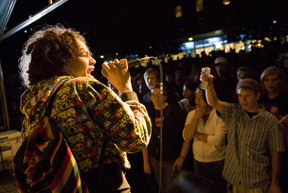
A student gives a spoken-word performance at Memorial Union Terrace.
A special event celebrates the creation of the Office of Multicultural Arts Initiatives, housed in the School of Education and conceived to help recruit students of color to campus by serving as a clearinghouse for multicultural arts programming.
Middle school and high school students spend part of the summer participating in PEOPLE, a program that works in partnership with public schools to identify academically promising students from culturally diverse and economically disadvantaged backgrounds, and provide them with ongoing academic support, including tutoring and summer enrichment. Total enrollment for the 2006–07 program is 1,225 students. Students who graduate from the program and are accepted at UW–Madison receive full–tuition scholarships, with 180 awarded thus far.
August 2006
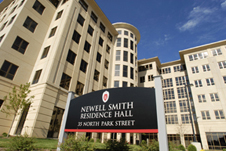
The 425-bed Newell Smith Hall opens.
Newell Smith Hall, the first major residence hall to open on campus since Ogg Hall in 1965, opens for fall move-in. The six-floor, 425-bed building has numerous features designed to help students succeed academically, including classrooms on the first floor, a tutoring office and study spaces throughout the facility. The building’s namesake served as University Housing director from 1955–83.
Wisconsin Welcome, the start-of-semester orientation program, refines its focus and expands deeper into the academic year than ever before. The program offers three two-week blocks that focus on social opportunities, personal and community health, and academic skills and support.
Marsha Mailick Seltzer, director of the university’s Waisman Center and an internationally recognized scholar of developmental disabilities, is named interim director of the new Wisconsin Institutes for Discovery, the $150 million public/private project that will house interdisciplinary research in new facilities in the 1300 block of University Avenue.
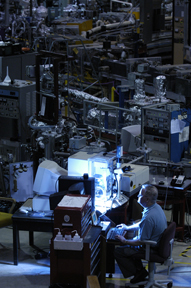
UW’s research efforts are ranked among top universities.
The university continues to earn top marks as a center for learning and research. Newly released statistics from the National Science Foundation place UW–Madison as the fourth largest research university in the country as measured by the amount of money spent on research and development — $764 million for 2004 in the areas of science, engineering, social sciences, and arts and humanities. The new NSF ranking includes all sources of support — state, federal and private. Wisconsin ranks first among universities in non-federal research support, attracting $329.5 million.
September 2006
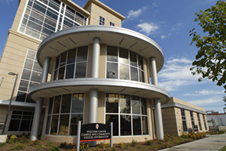
New Park Street facility welcomes visitors to campus and to Madison.
The university rolls out a new gateway to campus and the Madison area with the opening of the Welcome Center at 21 N. Park St. The new center’s services are provided through a collaboration among Visitor and Information Programs, Transportation Services, and the Greater Madison Convention and Visitors Bureau. The new facility features a state-of-the-art reception area staffed by students, as well as interactive displays, conference rooms, and a convenient drive-up window for parking and general information.
Senior Holly Bertera kicks off a new tradition, becoming the first student to deliver the keynote speech at the Chancellor’s Convocation for New Students. A Cottage Grove, Wis., native majoring in legal studies, Bertera was selected from a group of applicants who wrote essays answering the question, “What did you learn about yourself or others during your freshman year?”
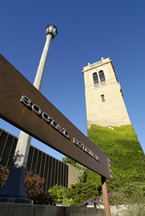
Renaming honors William H. Sewell.
The university commemorates the achievements of William H. Sewell by renaming the Social Sciences Building in his honor. The late sociology scholar and former UW–Madison chancellor, who first joined the faculty in 1946, made unparalleled contributions to building the university’s social sciences program, including his role in securing funding from the Wisconsin Alumni Research Foundation for social science research and in creating support for social and behavioral sciences at the National Institutes of Health and other federal agencies.
Joseph F. Kauffman, 84, UW–Madison emeritus professor of educational leadership, master administrator, one of the architects of the Peace Corps and dean of student affairs during the turbulent 1960s, passes away. Chancellor John D. Wiley says Kauffman will be remembered as “an idealist and innovative thinker who was well ahead of his time in understanding the educational power of service learning. He trained many of the university’s top leaders during his long association with the campus. His legacy is alive and well across UW–Madison.”
The Multicultural Orientation Reception, which welcomes students of all races, ethnicities and backgrounds into the campus community, marks its 25th year. The reception gives students the chance to meet and make friends, as well as build relationships with faculty and staff, as they begin their academic careers.
Brain-imaging studies by UW–Madison researchers find that the mere anticipation of a fearful situation can fire up two memory-forming regions of the brain — even before the event has occurred, meaning that the simple act of anticipation may play a surprisingly important role in how fresh the memory of a tough experience remains. The findings have important implications for the treatment of psychological conditions such as post-traumatic stress disorder and social anxiety.
The School of Human Ecology launches a new outreach and service-learning program aimed at helping economically disadvantaged preschoolers get a “jump start” on kindergarten, while giving college students experience in the classroom. The Jumpstart program aligns college students with 3- to 5-year-olds for a one-to-one learning experience through reading and discussion, helping children to develop language and social skills in the process.
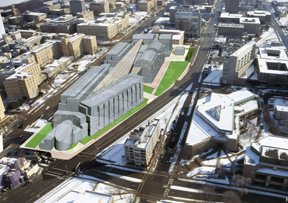
An architectural photo illustration shows the proposed Wisconsin Institutes of Discovery.
Officials announce that Uihlein Wilson Architects of Milwaukee, together with Ballinger of Philadelphia, will design the Wisconsin Institutes for Discovery. Carl Gulbrandsen, managing director of the Wisconsin Alumni Research Foundation and selection committee co-chair, says the winning team “understood the importance of creating an environment to facilitate interdisciplinary research, outreach and education, and they also clearly understood the importance and significance of the site in accomplishing this vision.” The team will employ a green approach to the building and indicates it will seek Leadership in Environment and Energy Design certification. If successful, it will be the first such building on the UW–Madison campus.